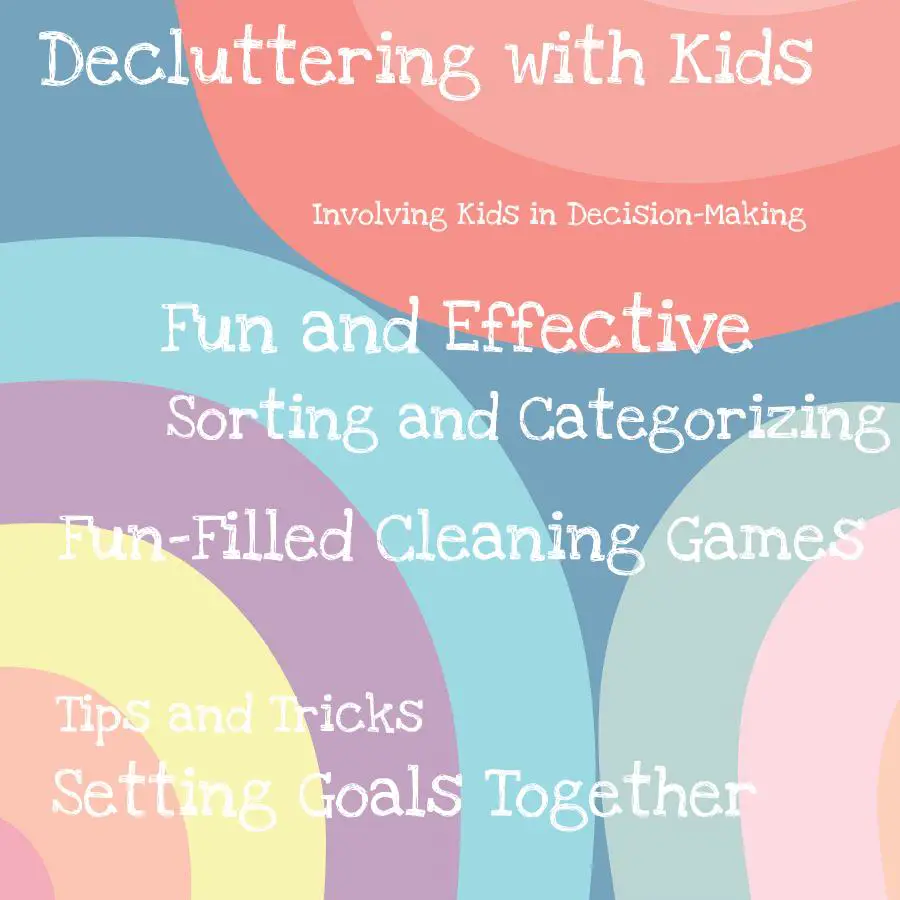Last updated on
In this blog post, discover effective and fun tips to declutter with your kids.
As a mom of three, I know the struggle of keeping a tidy and organized home while also trying to raise happy and healthy kids. It seems like every time I clean up one mess, another one pops up in its place.
But over the years, I’ve learned that decluttering with kids doesn’t have to be a nightmare. In fact, it can actually be an enjoyable experience for everyone involved!
I remember the first time I tried to get my kids on board with decluttering. My oldest son was about six at the time, and he had accumulated an impressive collection of toys that were taking over our living room.
Every day after school, he would dump out bins of Legos and action figures onto the floor, leaving me feeling overwhelmed and frustrated. One day, I decided enough was enough – it was time to tackle this mess once and for all.
But instead of just telling him we needed to get rid of some things (which let’s face it – never goes over well), I decided to make it into a game. We set a timer for 30 minutes and challenged ourselves to see how many toys we could donate or throw away during that time.
Suddenly, he was excited about getting rid of things! We laughed as we raced against the clock together, tossing broken toys into the trash can with glee.
Since then, decluttering has become something my family looks forward to doing together regularly (yes – even my husband!). And today, I want to share some tips and tricks that have helped us make decluttering with kids both fun AND effective – so you can enjoy a more organized home too!
Table of Contents
Setting Goals Together

One of the most important things I’ve learned about decluttering with kids is that it’s essential to set goals together. When my son and I first tackled his toy collection, we didn’t just dive in blindly – we talked about what our end goal was.
We wanted to create a space where he could easily find and play with his favorite toys without feeling overwhelmed by clutter. By setting this goal together, we were able to work towards something specific instead of just mindlessly throwing things away.
And when he started getting tired or frustrated during our 30-minute game, I reminded him of our end goal – which helped motivate him to keep going. Setting goals also helps your child feel like they have some control over the process.
Instead of feeling like you’re forcing them to get rid of their belongings, they’ll understand that you’re working towards a common objective as a family. So next time you start decluttering with your kids, take some time beforehand to talk about what your ultimate goal is for the space you’re tackling together.
It will make all the difference!
Sorting and Categorizing
Once we got into the swing of decluttering, my kids and I quickly realized that sorting and categorizing was a crucial step in making the process more manageable. We started by designating three piles: keep, donate/sell, and trash.
This helped us to stay organized as we went through each room in our house. But as any parent knows, getting kids to part with their belongings can be tough – even if they haven’t played with something in months! That’s why I found it helpful to involve them in the sorting process.
For example, when going through clothes or toys together, I would ask my children questions like “Do you still wear this?” or “When was the last time you played with this toy?”. By allowing them to make decisions about what stays and what goes (within reason), they felt empowered rather than forced into giving things up.
Another trick that worked well for us was creating subcategories within each pile. For example: keep for now vs keep forever; donate vs sell; broken beyond repair vs gently used but no longer needed.
This made it easier for everyone involved to see exactly where everything should go once we were finished decluttering. By taking these steps during our decluttering sessions over time has become less daunting task because everyone is on board from start till end which makes cleaning up much faster too!
Fun-Filled Cleaning Games
– The “Treasure Hunt” Game: This one works well for younger children who might not be able to help with the actual cleaning process but still want to feel involved. Hide small toys or treats around the room before starting, then challenge your child to find them all as they help tidy up.
– The “Sorting Olympics”: Make sorting items into piles (keep, donate/sell, trash) more exciting by timing each round and awarding points for speed and accuracy.
– The “Memory Match” Challenge: For older kids who need a bit more mental stimulation during cleaning sessions – create pairs of items that need organizing (e.g., socks), mix them up on the floor or table then have everyone race against each other trying match as many pairs as possible within 5 minutes.
By making decluttering fun-filled activities like these games instead of chores will encourage children’s participation while also teaching valuable life skills such as organization and responsibility in an enjoyable way!
Involving Kids in Decision-Making
One of the keys to making decluttering with kids a success is involving them in the decision-making process. After all, they’re more likely to let go of things if they feel like they have some control over what stays and what goes.
When my son and I were tackling his toy collection that day, we made sure to involve him in every step of the process. We asked him which toys he loved playing with most and which ones he could do without.
We talked about how other kids might enjoy playing with some of his gently used toys if we donated them instead of throwing them away. By giving your child a say in what stays and what goes, you’re not only teaching valuable decision-making skills but also helping them develop empathy for others who may benefit from their donations.
Another way to involve your children is by creating designated spaces for their belongings together – this can be as simple as labeling bins or shelves so everyone knows where things belong! By doing this, you’ll help teach responsibility while keeping clutter at bay.
Remember: decluttering doesn’t have to be stressful or overwhelming – it can actually be an enjoyable experience when done right! So grab your family members (even those reluctant spouses) and make it into a fun activity that brings everyone closer together while creating more space for joy in your home!
Creative Storage Solutions
Now that you’ve gotten your kids excited about decluttering, it’s time to start thinking about creative storage solutions. After all, the key to maintaining a clutter-free home is having designated spaces for everything.
But with kids, that can be easier said than done. When my son and I first tackled his toy collection, we quickly realized that we needed a better system for storing them.
We invested in some clear plastic bins with lids (so he could easily see what was inside), and labeled each one according to its contents – Legos in one bin, action figures in another, etc. But sometimes even bins aren’t enough – especially when it comes to larger items like stuffed animals or sports equipment.
That’s where creativity comes into play! One of my favorite storage solutions is using an over-the-door shoe organizer as a place to store small toys or art supplies (like markers and crayons). It keeps everything off the floor while still being easily accessible for little hands.
Another fun idea? Use decorative baskets or crates as bookshelves on your child’s wall! Not only does this add visual interest to their room decor-wise but also provides easy access when they want something new from their reading list! By getting creative with storage solutions like these ones mentioned above will not only help keep things organized but also make cleaning up after playtime more manageable too!
Establishing Routines
One of the most effective ways to make decluttering with kids a regular part of your routine is by establishing set times for it. For example, every Saturday morning after breakfast, my family spends 30 minutes going through one area of our home together.
This could be anything from a closet to a bookshelf or even just the junk drawer in our kitchen. By making it into a routine, we’ve found that everyone is more willing to participate and less likely to resist.
It’s become something we all expect and look forward to doing together – almost like an adventure! And because we only spend 30 minutes at a time on it, no one feels overwhelmed or burnt out. Of course, there are still days when someone isn’t feeling up for decluttering (we’re only human!), but having this established routine helps us stay on track overall.
Plus, seeing the progress we’ve made over time has been incredibly rewarding – not just in terms of having less clutter around our home but also as an opportunity for quality family time spent working towards common goals.
Rewards and Incentives
One of the most effective ways to make decluttering with kids fun is by offering rewards and incentives. After all, who doesn’t love a little motivation to get things done? In my family, we’ve found that setting goals and rewarding ourselves for reaching them has been a game-changer when it comes to keeping our home clutter-free.
For example, we might set a goal of cleaning out the playroom before the weekend is over. If we accomplish this task together as a family, then on Sunday afternoon, we’ll treat ourselves to an ice cream sundae bar or movie night at home.
This not only gives us something fun to look forward to but also helps us stay focused on our decluttering goals.
Another way you can use rewards and incentives is by letting your kids choose what they want their reward or incentive will be. Maybe your child has been eyeing up a new toy or book they really want – if they help you clean out their closet and donate some old clothes in good condition first, then maybe you can surprise them with that item as their reward!
By incorporating rewards into your decluttering routine with kids (and making sure everyone gets rewarded equally), it becomes less of an overwhelming chore and more like an exciting challenge for everyone involved!




